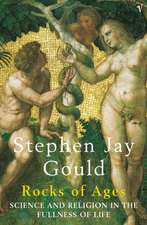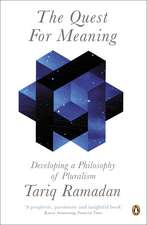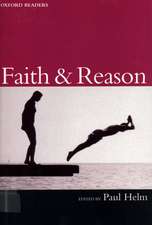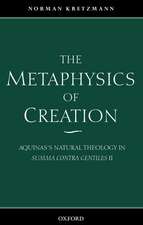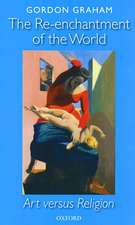Love of a God of Love: Towards a Transformation of the Philosophy of Religion
Autor Dr. Hugo Strandbergen Limba Engleză Paperback – 22 mai 2013
| Toate formatele și edițiile | Preț | Express |
|---|---|---|
| Paperback (1) | 297.76 lei 6-8 săpt. | |
| Bloomsbury Publishing – 22 mai 2013 | 297.76 lei 6-8 săpt. | |
| Hardback (1) | 831.83 lei 6-8 săpt. | |
| Bloomsbury Publishing – 16 noi 2011 | 831.83 lei 6-8 săpt. |
Preț: 297.76 lei
Nou
Puncte Express: 447
Preț estimativ în valută:
56.97€ • 59.49$ • 47.05£
56.97€ • 59.49$ • 47.05£
Carte tipărită la comandă
Livrare economică 15-29 aprilie
Preluare comenzi: 021 569.72.76
Specificații
ISBN-13: 9781623567491
ISBN-10: 1623567491
Pagini: 240
Ilustrații: black & white illustrations
Dimensiuni: 152 x 229 x 13 mm
Greutate: 0.34 kg
Editura: Bloomsbury Publishing
Colecția Bloomsbury Academic
Locul publicării:New York, United States
ISBN-10: 1623567491
Pagini: 240
Ilustrații: black & white illustrations
Dimensiuni: 152 x 229 x 13 mm
Greutate: 0.34 kg
Editura: Bloomsbury Publishing
Colecția Bloomsbury Academic
Locul publicării:New York, United States
Caracteristici
Argues against traditional epistemological conceptions of religious belief.
Notă biografică
Dr. Hugo Strandberg is Lecturer in theDepartment of Philosophy at Åbo Akademi University, Finland.His previous publications are Escaping My Responsibility: Investigations into the Nature of Morality(Peter Lang, 2009) and The Possibility of Discussion: Relativism, Truth andCriticism of Religious Beliefs (Ashgate, 2006).
Cuprins
Introduction 1. Formalism and negativism 2. The sources of theology 3. Phillips and the idea of a contemplative philosophy 4. Love of a God of love 5. Freedom and choice 6. Togetherness and community 7. The miraculous 8. Nature 9. The negative miracle 10. Arguing, thinking Bibliography
Recenzii
"Religious belief concerns a relation of love and this love is a love of a God of love. Through the theme of love Strandberg works out a philosophy of religion which does not understand religious belief hypothetically and evidentially. Faith is a relation and an existential endeavor primarily involving oneself. Strandberg is an original and serious thinker. His book presents an important alternative in the ongoing reflection upon what belief is and even more so, how to believe. I recommend this book to all those who appreciate perceptive and engaging thinking." -- Catharina Stenqvist, Professor of Religion and Philosophy, Lund University, Sweden
"Rejecting the 'formalist' distinction between the 'what' and the 'how' of believing, Hugo Strandberg offers a lucid and pathbreaking account of belief in God as love of a God of love. If, as Strandberg argues, the task of philosophy is to bring its audience into a new relationship with its subject matter-a relation of understanding, in which moral and religious demands cannot be evaded-it is a mark of his success that his study has the effect of rendering its subject not merely intelligible but compelling. Love of a God of Love is a major achievement of philosophical thinking." -- Richard Amesbury, Associate Professor of Ethics, Claremont School of Theology, USA
'When read as a thought-experiment, this book is provocative, even if not completely persuasive. Moreover, it offers a compelling defence of divine personalism that is worth taking seriously. Strandberg's ideas warrant consideration, and this book will yield a lively debate in the literature.'-Choice Magazine
Topics are discussed with special attention to linguistic philosophical elucidation and covermost bases currently of interest in analytic Christian philosophy of religion. Strandberg goes into great detail and with astute remarks at times is able to tease out what he considers the implications of concepts and ideas presented as properly basic to the field. The author shows good conceptual acumen, impressive analytical skills and offers dense rhetorical strategies coupled with interesting trains of thought on every subject.
"Rejecting the 'formalist' distinction between the 'what' and the 'how' of believing, Hugo Strandberg offers a lucid and pathbreaking account of belief in God as love of a God of love. If, as Strandberg argues, the task of philosophy is to bring its audience into a new relationship with its subject matter-a relation of understanding, in which moral and religious demands cannot be evaded-it is a mark of his success that his study has the effect of rendering its subject not merely intelligible but compelling. Love of a God of Love is a major achievement of philosophical thinking." -- Richard Amesbury, Associate Professor of Ethics, Claremont School of Theology, USA
'When read as a thought-experiment, this book is provocative, even if not completely persuasive. Moreover, it offers a compelling defence of divine personalism that is worth taking seriously. Strandberg's ideas warrant consideration, and this book will yield a lively debate in the literature.'-Choice Magazine
Topics are discussed with special attention to linguistic philosophical elucidation and covermost bases currently of interest in analytic Christian philosophy of religion. Strandberg goes into great detail and with astute remarks at times is able to tease out what he considers the implications of concepts and ideas presented as properly basic to the field. The author shows good conceptual acumen, impressive analytical skills and offers dense rhetorical strategies coupled with interesting trains of thought on every subject.
Descriere
Descriere de la o altă ediție sau format:
Traditionally, religious belief has in the philosophy of religion been understood along more or less epistemological lines. This title argues for an understanding of religious belief as love of a God of love, thereby over-turning traditional epistemologically based conceptions of religious belief.
Traditionally, religious belief has in the philosophy of religion been understood along more or less epistemological lines. This title argues for an understanding of religious belief as love of a God of love, thereby over-turning traditional epistemologically based conceptions of religious belief.

